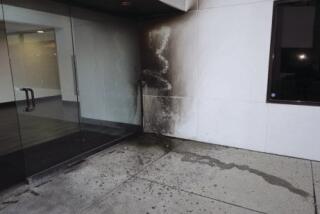Jordan Sentences Bomb Plotter
- Share via
CAIRO — A San Jose-born man was sentenced to be hanged Monday after a Jordanian military court found him guilty of plotting to blow up tourist sites during millennium celebrations. But the court acquitted him of being linked to Osama bin Laden’s Al Qaeda network.
For the second time, Jordanian prosecutors failed to convince a military judge in a state security court that Raed Hijazi, 33, was affiliated with Al Qaeda. That verdict underscored the difficulty U.S. prosecutors could face in trying to draw hard connections between suspects now in custody and Bin Laden’s organization.
But Chief Judge Tayel Raqqad found that there was sufficient evidence to convict--and execute--the former Cal State Sacramento business student for scheming to blow up sites that attracted Jewish and American tourists during New Year’s Eve celebrations in 1999.
“Where is God’s will? Why are you sentencing me to death?” Hijazi shouted after the verdict was read. “You are ruling against your people. [Israeli Prime Minister Ariel] Sharon doesn’t sentence his people to death.”
Had prosecutors succeeded in linking Hijazi to Al Qaeda, that might have helped quell some of the skepticism that remains in the Arab world concerning Bin Laden’s responsibility for the Sept. 11 attacks in the U.S. Many people in this region believe that the attacks were part of an Israeli conspiracy to undermine the Palestinian uprising. U.S. authorities had said there was evidence connecting Hijazi to a man arrested in Chicago who had direct links to the hijackings.
Raqqad, however, said there was no evidence that Bin Laden’s network has had any formal structure or membership in Jordan.
“You are found guilty of conspiracy to carry out terrorist attacks in Jordan, and your punishment is the death penalty,” the judge told Hijazi, a father of three who holds U.S. and Jordanian citizenship.
When Jordanian security agents broke up what they say was a terrorist cell in late 1999, Hijazi was in Syria. At the initial trial, five co-defendants and Hijazi were convicted of plotting the attacks but were acquitted of being connected to Al Qaeda. Hijazi was sentenced in absentia. After he was captured and extradited, he was granted a new trial. Prosecutors used the opportunity to revisit the issue of links to Bin Laden.
Hijazi’s lawyer said Monday that he will appeal the verdict and the sentence, a process that could take several years.
“The important sentence to me is that they dismissed charges of any relation with Al Qaeda, and this is an essential part of the case,” Muhammad Hijazi, 67, the father of the condemned man, said in a telephone interview from Jordan. “The sentence is unjust and is inhuman. He did absolutely nothing against any human being. . . . If he really wanted to attack U.S. targets, he would have done that there [in the U.S.]. Why would he come all the way over here to do that?”
Prosecutors said Hijazi confessed to his involvement in the plot, although he later said the confession was beaten out of him. Court records paint a detailed portrait of Hijazi’s activities and link him directly to bomb-making material and weapons.
Hijazi was introduced to radical Islamic ideas in 1991, when he met a Fijian militant while studying business at Cal State Sacramento, according to court papers. Five years later, prosecutors said, he went to Syria, where he met a militant who helped him craft a plan for building a terrorist cell in Jordan.
Prosecutors alleged that Hijazi and his co-conspirators worked together for years saving money, buying weapons and building and testing explosive devices. At one point, officials said, Hijazi worked as a taxi driver in Boston.
The millennium plotters’ goal was apparently to attack New Year’s revelers at Jordan’s Mt. Nebo, where biblical tradition says Moses saw the Promised Land, and at a site along the Jordan River where Jesus is said to have been baptized.
Prosecutors charged that Hijazi received weapons and explosives training at an Al Qaeda camp in Afghanistan and bought weapons in Iraq, including Kalashnikov rifles. But the core of the government’s case rested on the allegation that Hijazi and another man rented a house in which to store materials used in making explosives.
*
Ranwa Yehia of The Times’ Cairo Bureau contributed to this report.
More to Read
Sign up for Essential California
The most important California stories and recommendations in your inbox every morning.
You may occasionally receive promotional content from the Los Angeles Times.













